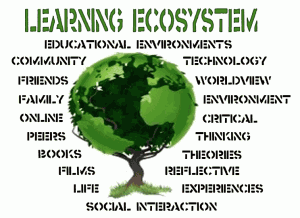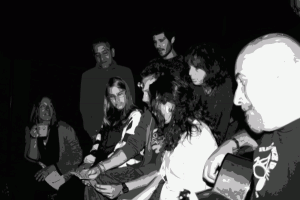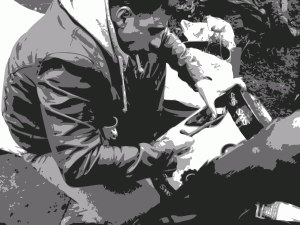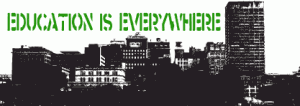“Education either functions as an instrument which is used to facilitate integration of the younger generation into the logic of the present system and bring about conformity or it becomes the practice of freedom, the means by which men and women deal critically and creatively with reality and discover how to participate in the transformation of their world.” Paulo Freire, Pedagogy of the Oppressed
What is Education?
To facilitate the kind of cultural shift that it needed to move us towards a sustainable and ecologically sound future that is underpinned by cooperation and equality, we need to re-evaluate and re-learn different ways of how we work within the world and how we interact and relate to it and each other. In order to achieve any of this, we need to educate ourselves and each other as we explore and experiment our way into a possible future.
 If we are to thrive and survive without killing the planet and everything else on it, Education has to be the central method of ensuring that useful and beneficial knowledge and skills are acquired by people to make the Transition into the future. There is also an overwhelming need to reclaim education from Neoliberalism and the Market Place where it used to mould passive conformity and selfish competitiveness into our students instead of community and cooperation. Ironically as we reclaim education from its Neoliberal grip by using education itself, it is education that is able to offer us the many alternatives and solutions that can emancipate the wider society from the prevailing Neoliberal hegemony.
If we are to thrive and survive without killing the planet and everything else on it, Education has to be the central method of ensuring that useful and beneficial knowledge and skills are acquired by people to make the Transition into the future. There is also an overwhelming need to reclaim education from Neoliberalism and the Market Place where it used to mould passive conformity and selfish competitiveness into our students instead of community and cooperation. Ironically as we reclaim education from its Neoliberal grip by using education itself, it is education that is able to offer us the many alternatives and solutions that can emancipate the wider society from the prevailing Neoliberal hegemony.
Although our task ahead is monumental and daunting, sometimes hopeless, the more we learn and educate ourselves, the more we find that there are many workable solutions and alternatives to the current predicament that we find ourselves in. As education is such an important tool in our emancipation and development as human beings it is important that we look at it holistically and begin with the basics as a means of beginning our exploration of developing ways of living in some sort of equilibrium with our habitat and its inhabitants.
Education a basic definition
Education, in a very general sense can be summed up at a basic level as referring to an experience or act that has a formative effect on the mind, character or physical ability of an individual. In the sense that it is formative means that education is serving to form something and particularly something that will have a long lasting effect on the persons mind and faculties. The most obvious example of this is the ability to understand and use language and mathematics a skill which is then utilised throughout an individual’s life.
Where does education take place
Within a modern context, formal education takes place in a whole variety of different venues including, Nurseries, primary and secondary schools, colleges, Universities, community centres, places of worship and more recently free schools. Education is not value free and all of these establishments will have different dynamics and structures, some being more problematic than others. Education is not confined to these areas and it can also take place in more informal settings and dynamics such as, friends teaching each other, voluntary groups providing education and practical learning based on action, amongst others. In fact any place or relationship can have an educational element to it, if you think about where you learn and who you learn from the list can be endless. Home education is one example of an informal education where the Parents take on the role of the educator.
Education within a social and cultural context
Within the social and cultural context, education can be seen as the process by which society transmits its accumulated knowledge, values and skills from one generation to the next. In this sense education is not only used to instil the values and norms of a given society, but is also an important element of the socialisation process. Different forms of education have different structures of learning that define the learning process and what is seen as educational achievement.
In western society, education is very much an individual endeavour based on accumulation of knowledge that is proven through individual assessment. This often based on hierarchal structures, such as schools and universities that award people for educational achievement based on their models own models. The educational system of a given society can say a lot about society itself as it often reflects the dominant values of that society. Sometimes it is the just as important to consider how you are being taught as well as what you are learning. Educational systems are not just about teaching people subjects, they are also about socialising people and transferring the value systems of the society in which they are situated.
 We believe that other forms of education such as learning through informal networks, home teaching, popular education, forum theatre and other alternative forms of education are much more inclusive and empowering than western mainstream education. Education does not have to be an individualistic, meritocratic experience, it can be cooperative, inclusive and community minded. Conventional education fails many people and writes them off when they do not conform to the rigid structures and expectations. Alternative methods of education can do the opposite and deliver education in more inclusive ways that is flexible and responsive.
We believe that other forms of education such as learning through informal networks, home teaching, popular education, forum theatre and other alternative forms of education are much more inclusive and empowering than western mainstream education. Education does not have to be an individualistic, meritocratic experience, it can be cooperative, inclusive and community minded. Conventional education fails many people and writes them off when they do not conform to the rigid structures and expectations. Alternative methods of education can do the opposite and deliver education in more inclusive ways that is flexible and responsive.
We need to learn to learn differently. We are all teachers and students in the school of life and not a day goes by where we do not learn something new about the world or teach someone else by passing on our knowledge. Education is not just for the schools.
Why is education important for developing a permanent culture
Without education the development of a Permanent Culture would be impossible. Education is needed to transmit the newly evolved ideas and practices that emanate from different streams of thought and disciplines. Education enables us to understand and implement permaculture projects in order to live lighter on the planet, whilst also caring for the planet, and our selves through the ways in which we use and distribute resources.
 Similarly, education illuminates histories that can inform and inspire our actions to move towards a sustainable future, it can show us the successes and failures of approaches that have attempted to change the world and the way we interact with it and also develop our understanding of how best to work in conjunction with nature.
Similarly, education illuminates histories that can inform and inspire our actions to move towards a sustainable future, it can show us the successes and failures of approaches that have attempted to change the world and the way we interact with it and also develop our understanding of how best to work in conjunction with nature.
Education can also teach us to be cooperative as opposed to competitive, which is vital for rebuilding communities and community ties that have been lost under the politics of self interest and individualism. If we apply critical thinking to our learning as Educationalists Paulo Freire and Peter McLaren have, education becomes a tool of emancipation for the economically oppressed that exposes economic and social injustice through critical analysis drawing on the vast wealth of knowledge of the political and social sciences and philosophy.
Education is crucial for developing understanding the local ecology and the inherent beneficial relationships that exist within ecosystems and communities. It also shows us how to form mutual and beneficial relationships by sharing and developing a variety of social and culturally useful skills, through developing intimate understanding of communities within the broader context of the world. These communities are not just human; they are the communities that exist in the soil and the communities that live on top of the soil, in the seas and in the skies.
We have the tools within our storehouse of teaching pedagogies (ways of teaching) a range of approaches. We also have the knowledge to utilise these pedagogies to bring about a Permanent Culture through developing a holistic and flexible curriculum that is egalitarian in nature, delivered in the setting which is best suited to the learner and learning, in order to instil useful and appropriate knowledge to build a Permanent Culture.
The purpose for this introduction was really to start to begin to thinking about education as a force for the collective good and a potential tool of emancipation. As part of the ongoing series of pieces, we will look at some of the different models, methods and perspectives within education and evaluate their qualities in terms of how useful they are in the part they play in a possible egalitarian, and ecologically sound future.



